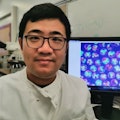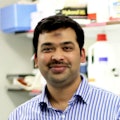Complex Nanofluid and Soft Matter Engineering
The Complex Nanofluid Engineering research group works on novel colloidal suspensions, microfluidic systems, and characterisation of solid particles in liquids.
The overall aim of the group is to deliver the next generation of functional soft condensed matter materials for both physics and life science applications.
Overview
Soft condensed matters refer to a class of materials that are deformable and reconfigurable, including nanoparticles, emulsions, foams, polymers and biological materials. Nanofluid engineering and microfluidics provides a powerful platform to precisely handle and manipulate liquid and nanoparticles with a high level of control, including fluid flow, confinement, and surface interaction at small scale. This enables new complex routes and capabilities to synthesise and design functional soft materials and systems in a bottom-up approach.
Key aspects and applications of nanofluids and soft matter engineering we are investigating:
- Particle Synthesis and Assembly: Nanoparticles from the building blocks for colloidal suspensions, ferrofluids, and coatings. The synthesis and characterisation of nanoparticles is essential for applications in the field of catalysis, imaging, and medicine.
- Fabrication of Microfluidic Devices: Rapid prototyping of microfluidic devices using multi-materials 3D printing.
- Microfluidic Rheology and Mechanics: COMSOL Multiphysics FEM modelling of microfluidic flow profiles under various physic fields
- Biological and Biomedical Applications: Cancer cells encapsulation in microgels, and anticancer drug screening using active drug delivery methods.
- Environmental and Energy Applications: Modifying electrical, magnetic, and thermal properties on a nanoscale improves bulk material properties leading to better environmental and energy systems efficiency while reducing costs.
Our aims
We are an agile team led by early career researchers working together to explore beyond the state-of-the-art soft technologies. We utilize a wide range of engineering methods to improve manufacturing and functionality of soft materials and explore their commercial value to stakeholders. We are currently focusing on the development of biocompatible magnetised materials for healthcare and medical applications.
Our research areas
A key feature of this theme is the interdisciplinary approach to the development of smart materials and advanced microfluidic technologies across several areas including:
- Ferrofluids for the fabrication of microfluid robots to selectively performing complex function in a variety of environments and the assembly for nanomagnetic devices for data storage.
- Multiphase microfluidics for the study of high-order emulsions formation using programmable microfluidics, and the applications of microparticles and microgels in both physics and life sciences research.
- Synthetic biology and artificial cells for the creation of bottom-up synthetic cells and the development of new soft matter engineering methods
Partners
We work closely with academic and industrial partners, and we are forging new collaborations in specific areas of this theme.
Academic Partners
- Bristol University - School of Engineering
- King’s College London - Department of Chemistry
- University of Oxford - Department of Chemistry
- Trento University - CIBIO
- Zurich University of Applied Science - School of Engineering
- Jožef Stefan Institute – Department of complex matter
Industrial Partners
Over the years, our team has worked with both large international corporations, national industries and SMEs. These include Unilever, GSK, KODAK, etc.
Funded opportunities for PhD students
We welcome PhD/MSc and final year project applications and provide a range of opportunities. Applicants should be self-funded or investigate potential funding and/or scholarships via e. g. Postgraduate Doctoral Loan. We especially welcome applications from disabled students and provide support with DSA applications.
Our researchers
Theme leaders
Research teams
Join us
We cordially invite the opportunity to provide supervision for master students, PhD students, and visiting Fellowships, participant on research and technology development projects.
Contact
Complex Nanofluid and Soft Matter Engineering Group
School of Engineering,
Cardiff University,
Queen's Buildings,
The Parade,
Cardiff,
CF24 3AA.
We welcome the involvement of collaborators in our cross-disciplinary research.







